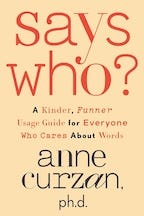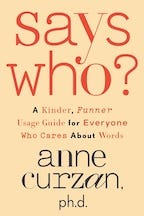A fun book about language
"Says Who" by Anne Curzan is a great book if you use (and enjoy) language
Says Who is a book about balancing two aspects of people who care about language: the wordie who enjoys seeing how language changes and the grammando who tends to follow the rules -- and insists that others do the same. (I particularly like the word “Grammando” to describe the person who likes to note every language violation.)
There are three recurring themes in the book:
• The rules are somewhat arbitrary and have shifted over the years,
• The important thing is understanding; sometimes, the rules clarify meaning, but in many cases, some usages that are at variance with “style” are perfectly clear and sometimes more impactful.
• Context matters: what matters in certain professional contexts, for example, is irrelevant -- and sometimes counterproductive -- in personal contexts.
The book helped me to reconsider my resistance to some usage. For example, while saying “more unique” seems counterintuitive, English is full of similar concepts that aren’t considered wrong (for example.... more pregnant?). And why do we say “irregardless” is redundant but not “debone”? And I now understand that “literally” to mean “figuratively” isn’t (ahem) unique. Though, as someone who favors brevity, I still feel a bit resistant to using “utilize” when the shorter “use” works and you don’t really need the slightly different meaning “utilize” conveys. And I am still probably not going to use “kiddo” when I’d normally use “kid” to refer to a child, but will care less when others do.
It was fun to learn when certain “eternal rules” came to be and how usage started. For example, the verb decimate (borrowed from Latin) used to mean ‘to kill one in every ten,’ and the word wife referred to any woman, not just married women, which is why we talk about midwives (women who are with the mother at birth) and old wives’ tales (old women’s tales). And some words that people complain about having been “verbed” started out as verbs.
Covering topics ranging from usage to punctuation, to changing words and full of history, Says Who reminds us that Language is personal, reflects our values, and constantly changes. As the author says “Debates about language are almost always about more than language,” and what matters is understanding. The chapters are short and self-contained, and the facts are made relatable with stories from the author’s personal and professional experience.
The message of the book isn’t that rules don’t matter. It’s that clarity and understanding matter more and that there is value in embracing the changes in language. Not all new usage makes for clearer, more concise writing (or speaking). But it’s worth considering why you react to certain usage patterns, and whether it’s work being critical if you in fact, under
If you enjoy language, get this book. And next time you find the urge to correct usage as “non-standard,” consider whether the words you read or hear are meaningful because that’s the purpose of language in the end.




